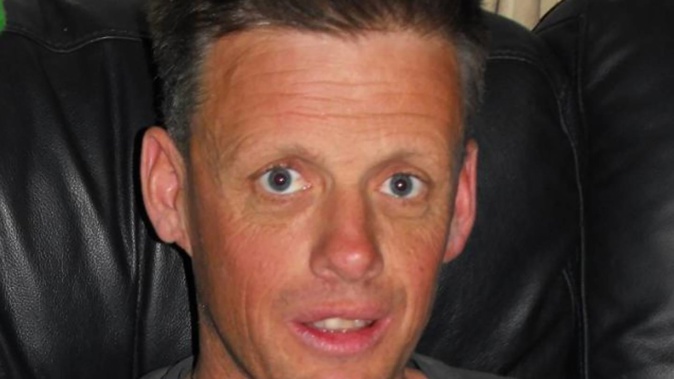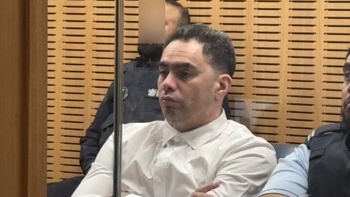
A top psychiatrist has told a court that Christchurch builder Michael McGrath, who vanished without a trace nearly six years ago and who the Crown alleges was murdered by a close friend, was likely at “low” risk of suicide when he disappeared.
McGrath had become “anxious and depressed” for several years after a 2010 operation for varicose veins left him feeling pain and unusual sensations in his legs.
He was referred to a specialist anxiety clinic where he got treatment from specialist psychologists and psychiatrists who noted his mood and symptoms could drop to severe levels.
At one stage, around late 2012/early 2013, things got so bad for McGrath that it was suggested he should either go into respite care or hospital – something he was not keen on, the High Court in Christchurch heard today.
Former Corrections officer David Benbow, 54, denies murder just weeks after his ex-partner Joanna Green started seeing McGrath.
The Crown alleges that Benbow lured 49-year-old McGrath to his Halswell property on Monday, May 22, 2017, and shot him dead before disposing of the body.
No body and no gun have ever been found.
Today, forensic psychiatrist Dr Erik Monasterio, the trial’s first expert witness, gave evidence.
He was asked to prepare a report on McGrath for the trial - and issues relating to suicide more generally – and to see whether the missing man could have been a suicide risk.
David Charles Benbow denies murdering Michael McGrath and is standing trial at the High Court in Christchurch. Photo / Kai Schwoerer, Stuff, Pool
- No new leads in case of missing man Michael McGrath
- Property police searched for Michael McGrath now up for sale
Monasterio was provided medical notes from McGrath’s GP, along with an anxiety disorders service that he attended, as well as witness statements.
The expert found that McGrath showed a propensity towards anxiety and had always been “somewhat a worrier”.
And so when he had a medical procedure which caused side effects of lower limb pain and unusual feelings in his legs, he over-worried it and became very anxious, the court heard.
“That excessive worrying is what tipped him into health anxiety and depression,” Monasterio said.
“And he got quite hopeless for a period of time there and it would seem his hopelessness was driven by the fact that he continued to have symptoms in his lower limbs and he also disengaged from activities that previously made him feel well such as regular exercise and engaging in paid employment.”
But over the course of his treatment, which saw him on common anti-depressant medication coupled with “a whole range of psychological interventions”, he “responded well enough”, especially when he started riding his bike again and doing carpentry work which he performed to a very high standard.
Friends and family of McGrath have already told the trial how they had been concerned over him during that period from 2010 to around 2014 but he had come out of it and started to be more like the man they used to know.
Monasterio found that before his disappearance McGrath was seemingly going through an “optimistic period in his life”, taking better care of himself, dressing better, looking to work more, riding his bicycle and exercising.
The trial is ongoing at the High Court in Christchurch. Photo / Pool
He had also entered into an intimate relationship with Green about two months earlier, the court has heard.
Asked by Crown prosecutor Barnaby Hawes whether McGrath during his “hopeless” period ever appeared suicidal, Monasterio replied that he never said to his clinicians he was thinking of killing himself, making suicide plans, or having suicide impulses.
However, on a number of occasions, he did advise his clinicians that if he had a significant health issue that would kill him he would see it as a form of relief.
So, he had “passive suicide ideation” without specific planning or intent, the witness said.
And when asked about McGrath’s risk of suicide at the time of his disappearance in May 2017, based on information made available to him, Monasterio responded: “The information available to me suggests that Mr McGrath at the time of disappearance was not exhibiting symptoms of a major mental illness. He was engaging in behaviours which were [good] for him, regular work, seemingly optimistic about the future, taking care of himself, not expressing a sense of hopelessness.”
He concluded: “Together in my opinion, based on that, the risks would have to be considered low.”
While the Crown accepts there is no body, no murder weapon, and little forensic evidence in the case, it says there is a strong circumstantial case consisting of many threads that, when taken together, show Benbow is guilty of McGrath’s murder beyond reasonable doubt.
They say Benbow had the motive, means and opportunity to kill McGrath.
Benbow’s defence team has warned the jury that the police had “investigative bias” and “tunnel vision” from early in its investigations.
Lead defence counsel Marc Corlett KC earlier said that “within hours” of McGrath’s disappearance, Green had pointed the finger of blame at Benbow “and the police duly obliged”.
The trial, before Justice Jonathan Eaton, continues.
Take your Radio, Podcasts and Music with you









